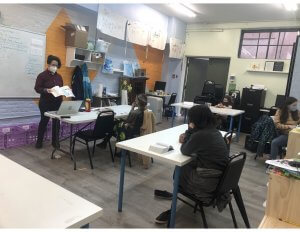Starting a new unit is a favorite process at Makom. We’re right at the beginning of taking on a whole new series of ideas- challenging our own assumptions and learning together as a group. Challenging the things we think everyday is essential to our new unit, as we explore Parshat Beha’Alotcha through the lens of perception and action.
We started by looking at ourselves in the mirror and asking ourselves what we saw?
- I see a girl who tries her best.
- I see someone who cut off half their hair and now it’s sort of growing back.
- I see someone with a smile you can’t help but return.
- I see a girl who dyed her hair and now it’s fading.
How did the stories we read in Beha’alotcha come from places or experiences we had in our own lives? What were some of the factors that could influence not only the way we see others but the way others perceive us?
- If someone gains my trust, I see them with a clearer and kinder eye. For me, someone’s political beliefs decide whether I want to interact with them or not. Even so, I’d rather not socialize at all.
- Wealth
- Race
- I like to say that I am very hardworking, my family and friends point it out a lot. But at the same time, it makes me overthink a lot, which has even more affects. I might think something is good, then 1 minute later think of something I could have done better, do I get upset and mad at myself.
We all have stories that we tell ourselves. Throughout this parsha, we’ll see that it’s nothing new. Big feelings abound.
Taking moments to consider how we feel and the messages we tell ourselves is vital to our own wellbeing. On Wednesday we considered some of the messages that are being sent to B’nai Yisrael during a portion of the text (Numbers 8:6) where the Levi’im are being elevated to a higher status.
How did it feel for each of these groups to see another group gain a new status?
- Why don’t I get to be elevated?
- I’m just as good of a Jew as they are!
- Why do I have to give sacrifices to this group if I’m not a part of it?
At the same time what might the internal dialogue of the Levi’im sound like?
- I’m proud to be chosen for this!
- This job is gonna be cool!
- I don’t know if I want this job. I’m not so sure it’s right for me!
It’s important to remind ourselves of the humanity of all of these characters- Moshe, The Levi’im, and B’nai Yisrael. They had thoughts, feelings and doubts just like us! They saw systems around them and had personal feelings about them. When we recognize the ways that we see each and every piece of the story around us, we begin to tune in to the story that we tell others.
When we take a moment to empathize with others, we strengthen the skills to empathize with ourselves.

